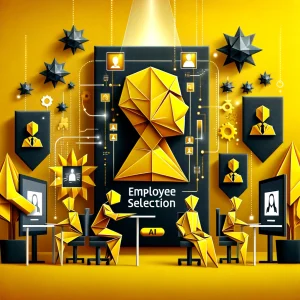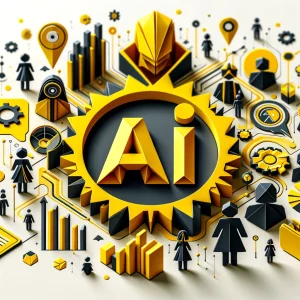In the dynamic world of human resources, artificial intelligence is emerging as a pivotal tool in transforming the employee selection and development process. AI’s capabilities extend far beyond automating routine tasks, offering innovative solutions that address traditional HR challenges with unprecedented speed and efficiency. As AI continues to evolve, its impact on employee selection and development will only grow more profound. AI is poised to revolutionize the way organizations recruit, select, and develop talent, ensuring that they have the right people in place to drive innovation, growth, and success.
AI in employee selection:
AI’s impact in the realm of employee selection, introducing a new era of efficiency, fairness, and candidate-centricity. By leveraging advanced algorithms and machine learning capabilities, AI is revolutionizing nearly every aspect of the recruitment process, from sourcing and screening candidates to conducting assessments and selecting the best fit for the role.
Efficient talent sourcing and screening:
The ability to handle large volumes of data with speed and accuracy is one of AI’s most significant contributions to employee selection. Traditional recruitment methods often involve manual screening of resumes and applications, a process that can be time-consuming and error-prone. AI-powered applicant tracking systems (ATS) can automate this process, scanning resumes for keywords, identifying relevant skills and experience, and even assessing cultural fit based on candidate profiles and online behaviour.
Reducing unconscious bias and fostering diversity:
Unconscious bias, deeply ingrained beliefs and stereotypes that can influence decision-making, is a persistent challenge in the hiring process. AI can help reduce these biases by relying on objective data and algorithms, eliminating the subjective factors that can lead to unfair assessments of candidates. By focusing on measurable criteria and performance indicators, AI can ensure that the best candidates are selected based on their true potential, regardless of personal characteristics or background.
Enhancing candidate experience and engagement:
Traditional recruitment processes often leave candidates feeling frustrated and disengaged. AI can transform this experience by providing a more personalized and interactive approach. Chatbots, powered by natural language processing, can provide timely responses to candidate queries, address concerns, and guide them through the recruitment process. AI can also personalize communication, tailoring messages and content to each candidate’s unique profile and interests.
AI-powered assessments for enhanced evaluation:
AI is enabling the development of more sophisticated and effective assessment tools for employee selection. AI-powered assessments can go beyond traditional methods, such as aptitude tests and interviews, to evaluate a wider range of skills and abilities, including cognitive abilities, emotional intelligence, personality traits, and cultural fit. These assessments can provide more comprehensive insights into candidate potential and help make informed hiring decisions.
AI in pre-employment screening and background checks:
AI is also playing a significant role in pre-employment screening and background checks. AI-powered tools can automate the process of verifying candidate credentials, such as educational qualifications and certifications, and conducting criminal background checks. This can save time and resources for both recruiters and candidates, ensuring that the screening process is efficient and thorough.
AI in employee development
AI is not just transforming the initial hiring process; it is also playing a growing role in talent management, enabling personalized learning experiences, accelerating career growth, and fostering a culture of continuous learning. AI’s ability to analyse vast amounts of data and tailor solutions to individual needs is transforming the landscape of employee development.
AI-powered personalized learning
Traditional training methods often fail to cater to the unique learning styles and preferences of each employee. AI, however, can provide personalized learning experiences that resonate with individual strengths and challenges. By analysing employee performance data, AI can identify areas for improvement and suggest relevant training modules. AI-powered platforms can even customize the learning content, delivery methods, and pace, ensuring that each employee receives an optimal learning experience.
Adaptive learning platforms for personalized growth
AI-enabled adaptive learning platforms are revolutionizing the way employees acquire new skills and knowledge. These platforms can dynamically adjust the difficulty level of training materials based on the employee’s progress. This personalized approach ensures that learning is challenging yet attainable, keeping employees engaged and motivated throughout the learning process. AI can also provide real-time feedback and assessments, allowing employees to track their progress and identify areas for improvement.
AI facilitating career exploration and guidance
AI is also playing a crucial role in career development, empowering employees to explore potential career paths within the organization. By analysing an employee’s skills, interests, and performance data, AI can generate personalized career recommendations. AI can suggest roles and projects that align with an employee’s career aspirations, helping them visualize their growth trajectory and fostering a sense of possibility within the organization.
AI-driven talent pool optimization
The insights gained from AI-powered employee development programs can also be used to optimize the talent pool within the organization. AI can identify high-potential individuals and map their skills and expertise. This data can inform succession planning efforts, ensuring that the organization has the right talent in place to meet its future needs.
AI in performance management and feedback
AI can also enhance performance management and feedback processes, providing data-driven insights to guide employee development. AI-powered tools can analyse employee performance data, identify trends, and uncover areas for improvement. This data can be used to generate personalized feedback reports, providing employees with actionable insights to enhance their performance. AI can also facilitate real-time feedback sessions, allowing managers to provide timely coaching and support.
AI fostering a culture of continuous learning
AI is not just a tool for individual development; it can also shape the overall culture of continuous learning within an organization. By embedding AI into employee development programs, organizations can create a culture where learning is encouraged, supported, and celebrated. This can lead to a more engaged, adaptable, and high-performing workforce.
Integrating AI with human oversight
While AI brings numerous advantages to employee selection and development, it is crucial to integrate these tools with human oversight. AI algorithms can provide valuable insights and automate tasks, but human expertise is essential to interpret these insights, make informed decisions, and ensure ethical practices.
HR Professionals as guardians of ethical AI:
HR professionals bear the responsibility of ensuring that AI tools are used ethically and responsibly in the workplace. This involves establishing clear guidelines for AI implementation, conducting regular audits of AI algorithms to detect potential biases, and providing training to HR teams on AI ethics. HR professionals must also advocate for transparency and accountability in AI decision-making processes.
Human intuition and empathy: complementing AI’s analytical power:
AI excels at processing large amounts of data and identifying patterns, but it lacks the human ability to understand context, nuances, and emotional cues. HR professionals, with their deep understanding of organizational culture, employee dynamics, and individual motivations, can provide a human perspective that complements AI’s analytical strengths. This human touch is essential for ensuring that AI-driven decisions are fair, equitable, and aligned with the organization’s values.
A symbiotic relationship: AI and human intelligence working together:
The integration of AI and human oversight is not about replacing human judgment with algorithms; it’s about creating a symbiotic relationship where AI’s strengths are leveraged to enhance human capabilities. AI can automate tasks, analyse data, and identify patterns, freeing up HR professionals to focus on more strategic and human-cantered aspects of employee selection and development.
AI’s potential in accelerating employee selection and development is transforming HR practices
By harnessing AI’s speed, efficiency, and data-driven insights, organizations can not only streamline crucial HR functions but also make them more effective and aligned with their strategic goals. As AI continues to evolve, its integration into HR practices promises a future where employee selection and development are more personalized, inclusive, and dynamic.
One of the primary ways AI enhances this process is through its ability to analyse large pools of candidates swiftly and accurately. Furthermore, AI can play a significant role in reducing biases in the recruitment process. Interactive AI tools, such as chatbots, can also improve the candidate experience during the recruitment process.
When it comes to employee development, AI offers tailored solutions that cater to the unique needs and learning styles of each employee. Moreover, AI can provide real-time feedback and assessments, allowing employees to track their growth and stay motivated, as well as can help them explore potential career paths within the organization. AI is poised to revolutionize the way organizations invest in their people, ensuring that they have the talent they need to thrive in a rapidly changing world.
It is important, to align AI with human judgement, to ensure ethical and effective implementation. HR professionals play a crucial role in interpreting AI-generated data and ensuring that decisions are made with a holistic understanding of both the organizational needs and the individual nuances of each employee. They also should ensure that AI tools are used ethically and effectively, complementing AI’s analytical capabilities with human empathy and strategic thinking.
By embracing AI responsibly and integrating it with human oversight, organizations can create a more human-centric HR approach. This approach recognizes the value of both AI’s analytical power and human judgment, ensuring that decisions are made with both efficiency and empathy. As AI continues to evolve, its role in HR will undoubtedly expand, but the need for human expertise will remain paramount.





